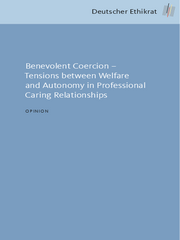Benevolent Coercion

phirakon jaisangat/stock.adobe.com
Measures that can be called benevolent coercion are widely spread throughout nursing homes, services for the disabled, and psychiatric departments of hospitals. Pertinent here, among others, are the liberty-depriving involuntary commitment of persons in clinics and other inpatient facilities, the involuntary treatment of psychological and somatic illnesses, the sedation through medication during challenging behaviour, as well as measures involving the deprivation of liberty such as the use of bed barriers or restraint straps and structural coercions, especially in stationary settings. Each one of these measures constitutes a grave intervention into the fundamental rights of the person concerned, so that they notably require ethical and legal justification, which consists of carefully balancing the person's self-determination and wellbeing. One (soft or indirect) form of coercion may be recognized in carelessly affirming the legal and ethical requirements for the use of coercive measures, e.g. declaring the person to be incapable of giving consent.
During the past years, the discussion focused particularly on coercion in psychiatry. After the supreme court had questioned the legal regulations as well as the legality of the practical application of coercive measures in psychiatry, the legislator reacted by reforming the Guardianship Law (Section 1906 BGB/Civil Code). Another reform is pending. Meanwhile the federal states are working on reforming the Involuntary-Treatment- and the Mental-Health-Law.
Measures of benevolent coercion in other practical fields – e.g. the somatic medicine, nursing, social work, child and youth services, and services for the disabled – are problematic as well but have been ignored for a long time. Only recently, somatic medicine has gained some attention. It is to be expected that the other practical fields might soon experience a growing pressure to justify themselves – not least with a view to the affected person's fundamental and human rights.
On 1 November 2018, the German Ethics Council published an Opinion answering the following questions: What forms of coercion can be identified? What role do coercive measures play in the mentioned practical fields? How is this ethically and legally problematic and where is a need for change in legislation and practical application?



